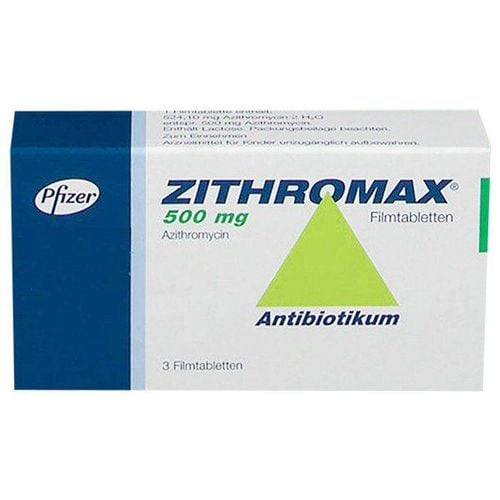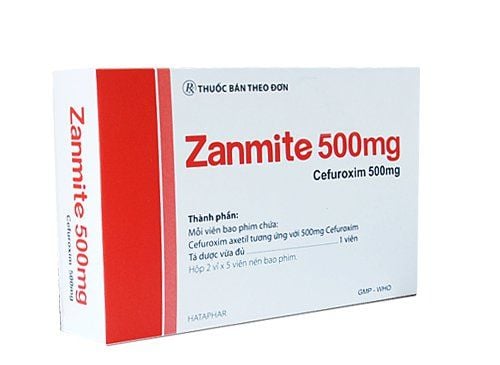This is an automatically translated article.
Cetrazone is an antibiotic with a broad spectrum of antibacterial activity against many strains of Gram-negative and Gram-positive bacteria. The drug is indicated in respiratory tract infections, gastrointestinal infections and preoperative infection prevention,...1. What is Cetrazone?
Cetrazone has the main ingredient is Ceftriaxone , a semi-synthetic antibiotic of the 3rd generation Cephalosporin group.
Cetrazone antibacterial through the mechanism of inhibiting bacterial cell wall synthesis by binding to proteins on the cell wall of bacteria. bacteria, preventing the multiplication of bacteria. The drug has a broad spectrum of activity against many common pathogenic Gram-negative and Gram-positive bacteria, including beta-lactamase bacteria.
The component Ceftriaxone is poorly absorbed from the gastrointestinal tract, so it should only be used by injection, intravenous infusion or intramuscular injection. After entering the body, the drug is distributed throughout the tissues and body fluids, penetrates the cerebrospinal fluid, placenta and breast milk. Cetrazone is metabolised in the liver and eliminated mainly by the kidneys.
2. Indications of the drug Cetrazone
Cetrazone is indicated in the following infections:
Upper and lower respiratory tract infections. Ear, nose and throat infections. Infections of the genitourinary system - urinary tract, gonorrhea, syphilis. Sepsis . Meningitis . Musculoskeletal infections. Skin and soft tissue infections. Gastrointestinal infections: Cholecystitis, peritonitis,... Prophylaxis of post-operative infections, endoscopic interventions.
3. Contraindications to the drug Cetrazone
Cetrazone drug is not contraindicated for use in the following medical conditions:
Allergy to Ceftriaxone, Cephalosporin antibiotics, Penicillin or any other ingredients of the drug. Premature infants. Patients with severe renal failure.
4. Notes when using Cetrazone
Patients allergic to penicillin may have a cross-allergic reaction to Cetrazone. Monitor liver and kidney function before and while taking Cetrazone. Do not use more than 2g/day. Newborns, especially preterm infants, take drugs that increase blood bilirubin. Drugs that cross the placenta and breast milk should consider the benefits before using Cetrazone in pregnant and lactating women.
5. Cetrazone drug interactions
Some interactions may occur when taking Cetrazone with other drugs:
Using high doses of Probenecid can cause high blood levels of Cetrazone, prolonging the effect of the drug. Co-administration of Cetrazone with potent diuretics increases the risk of nephrotoxicity. Alcohol, tobacco, and alcoholic foods while taking the drug can change the effect of the drug.
6. Dosage and usage
How to use:
Cetrazone is prepared as a powder for injection. Dissolve the drug with an appropriate amount of solvent, use intramuscular injection, intravenous injection, intravenous infusion. Use the medicine immediately after mixing. Dosage:
Common bacterial infections in adults and children over 12 years old: 1 - 2g/day divided into 2 injections; Intramuscular or intravenous injection. Maximum dose: 4g/day. Common infections in children from 15 days old to 12 years old: 20 - 80 mg/kg divided into 2 injections. Intramuscular or intravenous injection. Common infections in infants under 14 days: 20 - 50 mg/kg/day divided into 2 injections. Intramuscular or intravenous injection. Meningitis: 100mg/kg/day. Maximum dose 4g/day. Intravenous administration Gonococcal infection: Single intramuscular dose of 250mg/time. Prophylaxis before surgery: 1 - 2 g/time; Intravenous injection 30 - 90 minutes before surgery.
7. Side effects of the drug Cetrazone
Some unwanted effects may be encountered when taking Cetrazone:
Common side effects:
Diarrhea, abdominal pain. Allergic reactions, itching, rash. Uncommon side effects:
Fever. Phlebitis, angioedema. Eosinophilia, leukopenia, thrombocytopenia. Rare side effects
Headache, dizziness. Anaphylaxis . Blood clotting disorder. Pseudomembranous colitis. Acute renal failure. Increase liver enzymes. Thus, Cetrazone is a broad-spectrum antibiotic, indicated in many cases of severe to moderate infections. The drug needs to be prescribed and monitored by a doctor to avoid possible side effects or complications of infection and antibacterial.













